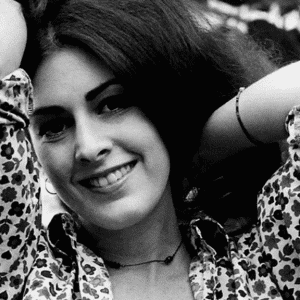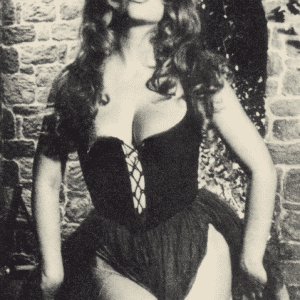Every generation has its icons—artists who transcend their craft and reshape how we view beauty, emotion, and performance. For Italian cinema, that figure was Monica Vitti. Known as both “The Goddess of the Silver Screen” and “The Ice Queen,” she possessed that rare paradox of warmth and distance, humor and melancholy. Whether she was brooding in Antonioni’s existential dramas or lighting up the screen in sharp-witted comedies, Monica Vitti didn’t just act—she enchanted.

From Rome’s Rooftops to the World Stage
Born Maria Luisa Ceciarelli on November 3, 1931, in Rome, Vitti’s path to fame was one of grit, vision, and reinvention. Growing up in postwar Italy meant living through scarcity and rebuilding, but Monica turned those hardships into inspiration. She found solace in imagination, often climbing rooftops to escape reality and dream of something greater.
Her fascination with performance led her to enroll in Rome’s National Academy of Dramatic Arts, where she graduated in 1953. Reinventing herself as Monica Vitti, she began her career in theater and voice dubbing—a humble beginning for someone destined to change Italian cinema. Those early years gave her discipline, emotional range, and the instinct to express more through silence than words.
The Antonioni Collaboration: Redefining Modern Cinema
Video : A Tribute to MONICA VITTI
Monica’s career transformed when she met visionary director Michelangelo Antonioni. Their collaboration would not only alter her life but also change the language of cinema itself.
Her breakthrough came in 1960 with L’Avventura. As Claudia, she captured the inner turmoil of a woman lost in both geography and identity. The film, initially booed at Cannes, went on to redefine modern storytelling—and Vitti’s haunting, introspective performance became its beating heart.
She continued to collaborate with Antonioni on La Notte (1961), L’Eclisse (1962), and Red Desert (1964). In these films, her expressive eyes and quiet gestures spoke volumes about human isolation, love, and alienation. Her chemistry with Antonioni—both artistic and romantic—was electric. Yet even after their relationship ended, she proved her brilliance was all her own.
Monica wasn’t just Antonioni’s muse; she was his equal—an actress who made emotion cinematic.
From Drama to Comedy: The Queen of Reinvention

After dominating the arthouse scene, Monica refused to be confined to one image. In the late 1960s, she shocked critics by reinventing herself as a comedic powerhouse.
Her turn in The Girl with a Pistol (1968) was a revelation—a Sicilian woman full of passion, humor, and fury. The performance earned her the David di Donatello Award and proved she could make audiences laugh as easily as she could make them think.

Throughout the 1970s and 1980s, she starred in hits like Dramma della Gelosia (1970) with Marcello Mastroianni and Polvere di Stelle (1973) alongside Alberto Sordi. Her comedic timing was sharp, her physicality impeccable, and her ability to balance humor with emotion unmatched.
And then, just to remind everyone of her depth, she stepped behind the camera to direct Scandalo segreto (Secret Scandal) in 1990. Few actresses have dared to transition so boldly—and even fewer have done it with her effortless grace.
A Private Woman with a Powerful Spirit

Despite her fame, Monica Vitti was notoriously private. Beneath the fame and glamour was a woman of deep introspection and quiet resilience. Her long partnership—and eventual marriage—with cinematographer Roberto Russo was one of devotion and mutual respect. They married in 1995, after more than two decades together, building a bond rooted in shared creativity and love.
While she had no children, Monica poured her nurturing energy into her art and her relationships. Even in the whirlwind of fame, she remained grounded, maintaining a sense of humor that her friends often described as disarmingly mischievous.
In her later years, Monica faced her greatest challenge: Alzheimer’s disease. She withdrew from the public eye in the early 2000s, with Roberto by her side until her passing in February 2022. Though illness silenced her voice, her spirit continued to echo through every film reel, photograph, and memory she left behind.
The Eternal Muse of Global Cinema
Video : Melancholic Monica Vitti tribute (Romantic Trumpet)
Monica Vitti’s influence didn’t stop at Italy’s borders—it rippled across the entire cinematic world. Filmmakers like Pedro Almodóvar and Sofia Coppola have cited her as an inspiration, while actresses such as Isabelle Huppert, Tilda Swinton, and Cate Blanchett carry echoes of her introspective power.
Her iconic collaborations with Antonioni continue to be studied in film schools as the gold standard of visual storytelling. And her versatility—from tragic intensity to comedic brilliance—set a benchmark for every actress who followed.
Awards poured in: multiple David di Donatello honors, Silver Ribbons, Golden Globes, and the Silver Lion for Lifetime Achievement at the Venice Film Festival. But the real reward was her immortality on screen—a timeless figure of sophistication, emotion, and truth.
Why Monica Vitti Still Matters

Why does Monica Vitti remain so captivating, even decades later? Because she represents something rare: authenticity.
In an era obsessed with perfection and speed, Monica’s performances remind us of the power of stillness. Her characters didn’t scream for attention; they invited reflection. She taught us that vulnerability could be strength, that silence could speak volumes, and that true artistry lies in honesty.
Her look—smoky eyes, sculpted cheekbones, that enigmatic smile—continues to inspire fashion and photography. Her spirit—complex, fearless, and endlessly creative—continues to inspire generations of artists who crave meaning over fame.
Conclusion: Monica Vitti—The Star Who Never Dimmed

Monica Vitti’s life was more than a filmography—it was poetry in motion. From the rooftops of Rome to the red carpets of Venice, she embodied everything that makes cinema unforgettable: mystery, humanity, and emotion.
She wasn’t just Antonioni’s muse or Italy’s sweetheart—she was a symbol of transformation. Whether making us question existence in L’Eclisse or laugh until tears in The Girl with a Pistol, she bridged art and emotion with elegance.
Though she passed in 2022, her legacy remains ageless. Monica Vitti didn’t fade away—she became part of the cinematic cosmos, forever flickering in the light of the silver screen.
Because true icons don’t just belong to their time—they define what timeless really means



